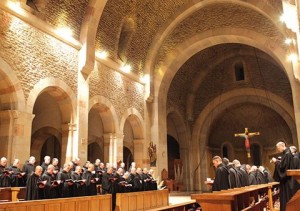 |
| Auxiliary Bishop Schneider on der Homepage of the Shrine of Maria Vesperbild. |
(kreuz.net) "The more committees, the more proceedings, the more fear of public opinion and the politically correct, the less there will be real reforms in the Church."
This is what Auxiliary Bishop Athanasius Schneider from Astana in Kazakhstan said on Pentecost Sunday at the Swabian pilgrimage Maria Vesperbild.
For Msgr Schneider it is "more than clear that the Church has experienced a great crisis."
Communion is Handed out Like Bread
The crisis shows itself in its most gripping in the declining Liturgy, for the prelate: "Today's manner of receiving Communion spread throughout the world is a great wound."
The body of Christ has been received "without recognizable sacral gestures of worship".
Hand communion leaves one with the impression as if one is taking a regular meal, which "one puts in ones' own mouth".
The Bible gives a different example of reverence
Msgr Schneider recalled that the angel and prophets in Holy Scripture knelt before Jesus Christ:
"How great is the contrast between today's widely spread form of handcommunion with the minimalistic signs of reverence on the one side and the glorious examples in Holy Scripture and the examples of Catholics frm the past two thousand years, and also the edifying examples of our own associates, parents, grandparents on the other side."
The example of the Pope
Msgr Schneider recalled then that Pope Benedict XVI has been distributing Holy Communion in the mouth since Corpus Christi of 2008 to the faithful on their knees:
"A true Catholic, and even more a Catholic Bishop, can not ignore the Pope's gestures."
That would be a true renewal
For the Auxiliary Bishop it would be a poignant sign of Faith if all the Masses world-wide "were brought back to clear signs of reverence, silence, the holiness of the music".
He criticized the supper table very carefully: priests and people should interiorly and exteriorly look together upon Christ -- he said.
All faithful should "receive the body of Christ self-evidently in the state of sanctifying grace, having gone too confession, and to receive it directly in the mouth with the piety of a child."
In this Msgr Schneider sees "powerful sings of a true renewal in the Church".
In such Masses a God fearing man should fall on his knees and say: "Verily, God is among you" [1Cor 14 24-25]
A Church of Believers -- not of Church-tax payers
The Auxiliary Bishop explained in his sermon an example of reform from Kazakhstan.
In the city of Karaganda the Catholics built one Church every 35 years under the Communists.
The authorities allowed only a lowly, utilitarian building without towers or a cross.
For two years the faithful -- also the elderly and the children --- were occupied with the building.
They dug even in the earth, in order to put the church deeper in order to allow for a larger interior space.
Without Discussions or Commissions
After the completion of construction there was no Bishop far and wide who could have blessed the church.
Actually the parish priest -- he was called Pater Alexander Chira by everyone -- promised the faithful that God would send a Bishop.
On the day of the blessing he appeared himself with a mitre and shepherd's staff in the church. He was a secret Bishop.
According to a woman who witnessed the event, there were even more tears flowing than holy water.
The church blessing is an example for Msgr Schneider "of true reform of the Church without a lot of commissions and discussions."
Link to kreuz.net...














